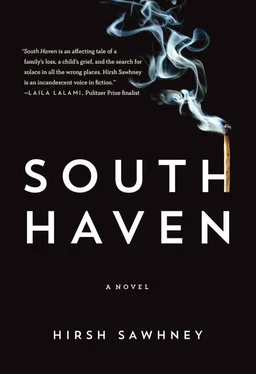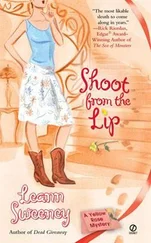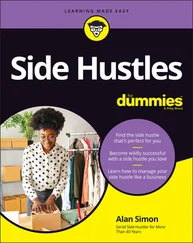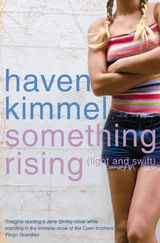Thanks to a traffic jam near Hartford, it took them more than two hours to reach Bradley Airport. They drove though the arrivals area twice without spotting Arjun. Mohan Lal said he would keep on circling while the other two looked for him, but Ms. Farber insisted that he park, and that all three of them go inside and greet him together. They eventually found Arjun on a bench outside near a car rental booth. He was reading a copy of Harper’s and carrying a green backpack, the kind you would use for camping. His goatee was still there, but there was also a lot of stubble high on his cheeks — as if he hadn’t shaved in a couple of days.
Mohan Lal greeted him first with a trademark side hug, his face beaming. “Welcome home, son. What happened to your beard?” he asked, grasping Arjun’s chin. “Has my pinko turned into a bloody mullah?”
Smiling, Arjun clapped him on the back. “Oh, Dad,” he said. “Maybe it’s good that some things never change.”
Ms. Farber placed both of her hands on Arjun’s shoulders. She was wearing heels, and was almost as tall as him. “Let me have a look at you. You’re so handsome — just like Dad.” She kissed him once on each of his cheeks.
Finally, it was Siddharth’s turn to say hello, but he found that he was frozen. He just stared at his brother, a lump forming in his throat.
“You’re huge,” said Arjun. “I bet I can’t even pick you up anymore.”
Arjun bent down and embraced him, and the sound of the screeching cars and chattering travelers suddenly disappeared. In that moment, it was as if he and his brother were the only people at the airport — the only living people in the world. Arjun’s strong arms were the best thing he had felt in ages.
* * *
As they cleared the airport, Arjun asked if they could turn off the air-conditioning, as it aggravated his breathing. He told them about his bumpy flight, which had arrived forty minutes early, and how he had sat next to a state senator, talking to him about reproductive rights for the entire time. Siddharth couldn’t take his eyes off his brother’s Indian sandals, which were made of leather and exposed his bristly toes. He hoped Arjun would take off these faggy shoes before meeting Marc.
Ms. Farber asked Arjun for his thoughts on the upcoming election, but before he could respond, Siddharth said that voting for a third party was the best thing for the health of a nation, mimicking one of his father’s current talking points.
“Good man,” said Mohan Lal.
“Unlike my brother,” said Arjun, “I can’t say that I share my father’s views. A vote for Perot is basically a vote for Bush.”
They passed the Colt factory, the one that looked like a mosque, and then a bright billboard advertising an alternative rock station that Siddharth had started waking up to on his clock radio. While he stared out the window, resting his thigh against his brother’s, Arjun went on about the inner-city poor. He said that the government needed to give these people tools to live with dignity, and that Clinton was the only candidate who might do this.
“Oh, you’re so articulate,” said Ms. Farber. “I guess it runs in the family. My only worry about Clinton is Israel. I’m just not convinced he’ll prioritize the Jewish people.”
Arjun nudged him and arched his eyebrows. Siddharth smirked, though he had no idea what his brother was getting at.
“The point is,” said Arjun, “Bush led this country into a ridiculous war. Thousands of innocent people are dead, including some Americans.”
“What about the Kuwaitis?” asked Ms. Farber. “Didn’t someone have to stand up for Kuwaitis?”
“Exactly, Rachel,” said Mohan Lal. “If you ask me, the world should be thanking Bush.” Siddharth wasn’t surprised by Mohan Lal’s words — he was used to his father changing his mind. “Say what you will,” Mohan Lal continued, “but this man has done a great thing.”
“Great?” Arjun responded. “Invading a country for oil is now a mark of greatness?”
“Why do we revere the kings of antiquity?” said Mohan Lal. “Not for making peace, but because they secured resources.”
Arjun pulled at his whiskers. “You’re kidding me, Dad.”
“Why would I be kidding? Son, Bush has shown the world how to stand up to these Muslims. For that I admire him.”
“I know you know better,” said Arjun. “I know you’re not that dumb.”
Siddharth shot his brother a look.
“Yes, son,” said Mohan Lal, “your father is a very—”
“Arjun,” interrupted Ms. Farber, “I hope you’re hungry. Your father has prepared quite a feast for you.”
* * *
When they got home, Marc greeted Arjun at the door and shook his hand. Arjun said he had heard that Marc was a big Yankees fan. Marc said, “The Mets. I think you mean the Mets.” Siddharth knew this was a lie, that his friend really loved the Yankees. But he didn’t say anything. Ms. Farber showed Arjun to the guest room and brought him a bath towel, and Siddharth found this whole interaction unsettling. She seemed to be treating his brother like a guest even though this was his house, not hers. But Arjun didn’t seem to mind the attention. Before getting into the shower, he told Ms. Farber that the place felt so alive with her and Marc around. These words wounded Siddharth. He wondered what it had seemed like before. Was it too depressing? Or just really boring?
As Mohan Lal heated up their dinner — rajma, bharta, chicken, and paneer — Ms. Farber set the table and plied Arjun with questions about Michigan. He told her that balancing his part-time job with schoolwork was challenging but doable. In May, he had moved into a co-op, where everyone shared the household chores and threw parties together. He explained that over the summer, he had been taking an intensive Hindi course.
Mohan Lal started coughing. “Hindi? You should be focusing on your premed.”
“Oh, Mo,” said Ms. Farber, “you should be proud. Gents, how about a little wine?”
“I’d love a glass,” said Arjun.
“Wine?” said Mohan Lal. “He’s only nineteen.”
Arjun laughed, but it wasn’t a pleasant laugh. “If I’m old enough to pay the rent, I think I can have a little wine.”
“Come on, Mo,” said Ms. Farber, “one glass isn’t gonna hurt.”
“Wait,” said Marc, “if he gets to break the law, then I’m gonna too.”
“Yeah, me too,” said Siddharth.
When they were all seated at the kitchen table, Mohan Lal uncorked a bottle of red wine and poured out three glasses. “To what shall we toast?”
“Hang on.” Arjun got two small brandy glasses from the dining room cabinet and poured out a little wine for Siddharth and Marc. “In France, kids drink wine all the time. The Europeans have a much healthier relationship with alcohol.”
“Let’s move to France,” said Marc.
Siddharth chuckled. “Yeah, I wanna live in France.”
“How about we toast us ?” said Ms. Farber. “To new beginnings — to the five of us finally being together.”
“To us,” said Mohan Lal.
Looking around the table, Siddharth felt a surge of contentment. This was his new family, and they were finally all together.
* * *
Later that night, when Mohan Lal and Ms. Farber were in bed and Marc was watching a repeat of The Tonight Show , Siddharth knocked on the door of the guest room.
“Come in,” said Arjun.
He entered.
Arjun was reading a book. “Give me a sec,” he said. “I gotta finish my page.”
His brother was reading yet another book about India. It was written by someone named Romila, an ugly name. It reminded him of Attila, or Brunehilda. Siddharth sat on the edge of the bed and stared at his brother. Arjun had on boxer shorts with little sailboats, and he wasn’t wearing a shirt. The downy hair on his belly had gotten thicker, and so had the tuft at the center of his chest. As usual, Arjun had on the gold chain that he’d worn every day for the last five years, but he’d taken off the gold King George coin that their grandfather had given them. Siddharth wondered why Arjun had removed it. Had he sold it for drugs?
Читать дальше












